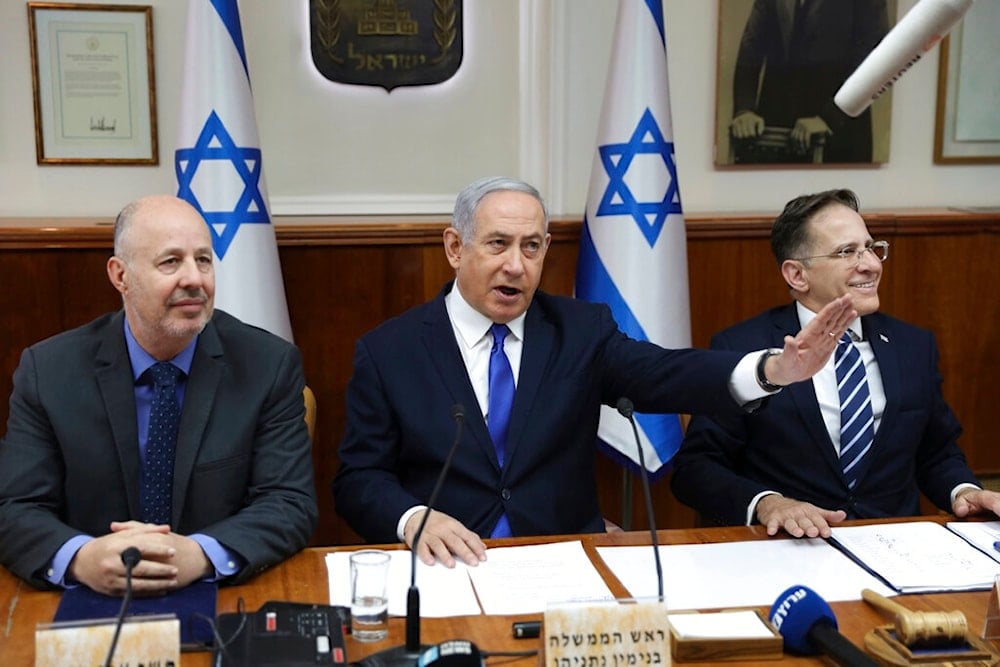'Israel' in direct, daily contact with new Syrian gov.: Israeli media
The head of the Israeli "National Security" Council confirms political and security talks with Syrian officials, with normalization being a key goal.
-

Israeli Prime Minister Benjamin Netanyahu, center, Minister for Regional Cooperation Tzachi Hanegbi, left, and Cabinet Secretary Tzahi Braverman attend the weekly cabinet meeting at the prime minister's office in al-Quds, occupied Palestine, Sunday, Dec. 29, 2019 (Pool photo via AP)
Direct, daily dialogue exists between "Israel" and the new Syrian government, revealed Tzachi Hanegbi, head of the Israeli "National Security" Council, according to Israel Hayom.
During a closed session of the Knesset's Foreign Affairs and Defense Committee, Hanegbi indicated that the talks include both political and security coordination and are personally supervised by him, as part of potential normalization efforts between the two sides.
“There is direct daily dialogue at all levels between Israel and the regime in Syria. I am leading it with political officials there,” he said.
A couple of weeks ago, Israeli Prime Minister Benjamin Netanyahu expressed interest in initiating US-mediated negotiations with the new Syrian government, according to two Israeli officials, as cited by Axios.
Syria, Lebanon candidates for Abraham Accords normalization agreements
According to Hanegbi, Syria and Lebanon are currently the closest regional states to potentially normalize ties with the Israeli occupation, confirming previous media reports of newly established communication channels with Damascus.
Hanegbi referenced past statements by Syrian transitional president Ahmad al-Sharaa during his meeting with French President Emmanuel Macron, where al-Sharaa spoke of indirect dialogue with "Israel".
Normalization conditions, buffer zone withdrawal
When asked by Knesset member Amit Halevi whether normalization could lead to a withdrawal from the buffer zone in Syria, Hanegbi responded, “If there is normalization, we’ll examine this,” but clarified that “we will not withdraw from the Syrian Hermon.”
An Intelligence Directorate official informed the committee that al-Sharaa has not abandoned his extremist ideological views, recalling his 2014 statement, "Next year we’ll reach Damascus—and then continue to al-Quds." Hanegbi replied, “We are evaluating it. Sharaa is being shaped as things move forward.”
Could war against Iran be used to leverage normalization?
Knesset member Merav Michaeli questioned whether the war against Iran could be used to leverage additional normalization agreements across the region.
Hanegbi strongly criticized the leaking of details from the closed session, calling the leaks "disgraceful" and a threat to the committee’s credibility.
He warned that such disclosures are criminal offenses that could dissuade security agency leaders from providing candid briefings.
He added that if called again to address the full committee, he would bring copies of last week’s newspapers and read their headlines aloud.
Al-Sharaa seeks cooperation with 'Israel'
Al-Sharaa previously claimed that Syria and the Israeli occupation "have common enemies" as he called for an end to what he called "tit-for-tat bombings" and stressed the need for regional stability through cooperation.
"The era of endless tit-for-tat bombings must end. No nation prospers when its skies are filled with fear. The reality is, we have common enemies, and we can play a major role in regional security," al-Sharaa said, in reference to "Israel", during an interview for the Jewish Journal.
Furthermore, he expressed his desire to return to the 1974 disengagement agreement between Syria and "Israel", not merely as a ceasefire line but as a platform for "mutual restraint and civilian protection," claiming that this framework could ensure safety, particularly for the Druze communities in southern Syria and the occupied Syrian Golan Heights.
This came amid multiple reports about direct Syrian-Israeli engagement, despite continued Israeli aggression and violations in Syria.
Read more: Al-Sharaa open to political settlement with 'Israel'

 4 Min Read
4 Min Read








